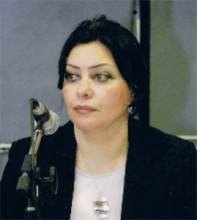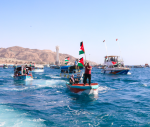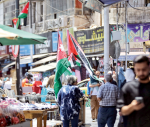You are here
Israel’s all -out war on Gaza’s health System
Nov 24,2024 - Last updated at Nov 24,2024
For more than one year ,Israel’s all-out war on Gaza and punishing siege have destroyed the Strip , displaced its people and choked off access to desperately needed food, water, and medicine.
Hospitals sieged, ambulances attacked , doctors arrested …Israel's deadliest and most destructive war on Gaza has demolished entire neighborhoods ,rendered large swathes of the strip uninhabitable and has seen unprecedented attacks on all aspects of its already fragile health system leaving its medical and humanitarian situation catastrophic.
Since the October 7 attack of last year, the Israeli military campaign in Gaza has killed more than 44,000Palestinians mostly women and children, wounded, 104,286, more than 10 ,000 missing, most of them probably buried under the rubble and almost the entire population of the territory displaced amid the ongoing blockade .
Last October, the UN Independent Commission report presented to the UN General Assembly concluded that Israeli security forces have deliberately killed, wounded, arrested, detained, mistreated and tortured health workers, alleging war crimes and the crime against humanity of extermination.
Although hospitals and health care centers are built to be places of healing and enjoy special protection under international law, Israeli attacks on health care started in the immediate aftermath of last year Oct. 7 assault.
The Israeli military has attacked, destroyed or severely damaged hospitals across Gaza, in apparent systematic fashion, effectively crippling the healthcare system at a time of drastically increased needs.
Between November and December 2023, the Israeli forces attacked Al Shifa Medical Complex in Gaza City, the largest in Gaza, and the Indonesian, Al Awda, and Kamal Adwan hospitals in North Gaza.
By January 2024, Israeli attacks reached Al Aqsa Martyrs Hospital in Middle Gaza, the largest medical facility in the area. The focus of attacks then moved on to western Khan Younis, where the army intensified their ground operations, targeting the two main functioning hospitals in the area, Nasser Medical Complex and Al Amal Hospital.
Both facilities were raided twice and rendered non-functional by the end of March 2024.
Most of Gaza’s 36 hospitals had been bombed, many repeatedly Involving direct strikes, sieges, the use of snipers, raids, apparent arbitrary detention and ill-treatment of medical staff, patients and their companions, and internally displaced persons (IDPs) sheltering at hospitals.
In addition to hospitals , Israeli forces have repeatedly targeted ambulances , medical aid convoys and access roads.
Israel has arrested health care workers, killed emergency medical workers, blockaded fuel needed for generators, and withheld critical medical and surgical supplies—all of which are intended to undermine Gaza’s health care system.
Since the war began, the World Health Organisation (WHO) has verified 516 attacks on health facilities and medical transport in Gaza, resulting in 765 deaths and almost 1000 injuries.
Ninty-four per cent of all health facilities in Gaza are either damaged or destroyed; only 17 out of 36 hospitals with inpatient capacity now are even partially functional and 85 per cent of water and sanitation facilities are out of service.
Gaza’s only hospitals providing treatment for adults and children with cancer , the Turkish – Palestinian Friendship Hospital and AL- Rantisi Specialized Hospital for Children , have been bombed, besieged and forced to close.
Those hospitals , ambulancesand clinics that have survived bombing have been debilitated by blockadeand obstruction of humanitarian convoys , depriving health care providersof not only water , fuel and electricity but also critical medical supplies, such as oxygen , blood and anesthesia.
From childhood vaccinations to cancer treatment and dialysis , modern medical care has largely come to a standstill for the 2.3 million Palestinians in Gaza.
Additionally , as Gaza’s healthcare options were limited, thousands of patients who previously were receiving specialized medical attention in the West Bank, including occupied Jerusalem, or in Israel, a process that demanded permits from Israel , have been unable to have them .
Every day, hundreds of women give birth in traumatic, unhygienic and undignified conditions; amidst this chaotic situation , often wherever they are sheltering rather than in any medical facility.
Of these women WHO estimated , 15 per cent suffer complications and without lifesaving procedures die in childbirth .
Furthermore , the bombing and closure of Gaza’s two rehabilitation hospitals left around 441,000 people with preexisting disabilities – constituting 21 percent of prewar households , a number that is now likely much higher –with no place to receive care or access crutches, wheelchairs , or prostheses.
On the other hand, restrictions and limitations imposed by Israel on humanitarian aid on the entry and distribution of goods and services necessary for the survival of the civilian population brought the risk of severe famine and starvation to Gaza.
Almost the entire population of Gaza faces now high levels of food insecurity, and 60 thousand children under five are estimated to have acute malnutrition.
Moreover, the decision by Israel’s Knesset on October 28 to ban UNRWA and put an end to its activities , will eliminate one of the largest providers of essential health services in Gaza.
Every day, UNRWA provides thousands of medical consultations, vaccinates hundreds of children, provides maternal and child care, and so much more.
Nearly 1.9 million displaced people rely on UNRWA, and 1.6 million Palestinians receive health care through its clinics and medical points.
This ban will deepen the suffering of the people of Gaza, deprive them of essential health services and increase the risk of disease outbreaks.
Today , Gaza’s health care system is on the edge of collapse which will have consequences on people’s health, not just in the immediate term, but in the weeks , months and years to come.
Gaza is in a complex challenge that requires a coordinated international approach involving healthcare provision, economic policy, workforce integration, social support, and infrastructural development. It demands both , immediate action to provide for current needs and long-term planning to secure a more inclusive and supportive society.
All this foreseen impact requires an immediate ceasefire and halt of all aggression forms against Gaza and its citizens.














Add new comment